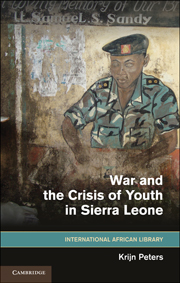Book contents
- Frontmatter
- Contents
- Acknowledgements
- Abbreviations
- Introduction
- 1 Voices from the Battlefield: Ex-Combatants' Views on Root Causes of the War and Their Reasons for Participation
- 2 The Socio-Economic Crisis of Rural Youth
- 3 Conflict in Sierra Leone and Recruits to the War
- 4 The World of the RUF
- 5 Malfunctions and Atrocities
- 6 Cultivating Peace: RUF Ex-Combatants' Involvement in Post-War Agricultural Projects
- 7 Footpaths to Reintegration? Agrarian Solutions for the Reintegration of Ex-Combatants
- 8 Conclusion: The RUF as a Rural Underclass Project
- Epilogue
- Annex I A Chronology
- Annex II Overview: Interviewed Ex-RUF Combatants
- References
- Index
- THE INTERNATIONAL AFRICAN LIBRARY
2 - The Socio-Economic Crisis of Rural Youth
Published online by Cambridge University Press: 03 May 2011
- Frontmatter
- Contents
- Acknowledgements
- Abbreviations
- Introduction
- 1 Voices from the Battlefield: Ex-Combatants' Views on Root Causes of the War and Their Reasons for Participation
- 2 The Socio-Economic Crisis of Rural Youth
- 3 Conflict in Sierra Leone and Recruits to the War
- 4 The World of the RUF
- 5 Malfunctions and Atrocities
- 6 Cultivating Peace: RUF Ex-Combatants' Involvement in Post-War Agricultural Projects
- 7 Footpaths to Reintegration? Agrarian Solutions for the Reintegration of Ex-Combatants
- 8 Conclusion: The RUF as a Rural Underclass Project
- Epilogue
- Annex I A Chronology
- Annex II Overview: Interviewed Ex-RUF Combatants
- References
- Index
- THE INTERNATIONAL AFRICAN LIBRARY
Summary
Introduction
The root causes of the conflict in Sierra Leone, as suggested by the ex-combatants presented in the previous chapter, can be divided into two kinds. One group consists of issues playing out on the local level: complaints about a general unwillingness of seniors to help their juniors; the injustice meted out by local courts controlled by corrupt elders and chiefs; and the control these elders exercised over productive and reproductive means, such as land and labour, and the resources necessary for marriage. The other group of causes plays out at the national or state level. Here, the focus is on the state's failure to provide accessible education for all; lack of job opportunities; and desire for a democratic system to replace an unfair and divisive clientelism. Gberie criticises some Western academics, conciliators, and aid agency workers for ‘presenting the murderous RUF as something of a misunderstood and misrepresented rural rebellion against the failed “patrimonial” state of Sierra Leone’ (2005: 13). But, as we have seen in the previous chapter, it was not only Western observers or aid workers who interpreted the conflict like this; many of the combatants who participated did so too.
This chapter offers a historical analysis to examine whether indeed Sierra Leone was a patrimonial state, and why this system failed to meet the expectations of many of its subjects.
- Type
- Chapter
- Information
- War and the Crisis of Youth in Sierra Leone , pp. 34 - 61Publisher: Cambridge University PressPrint publication year: 2011



